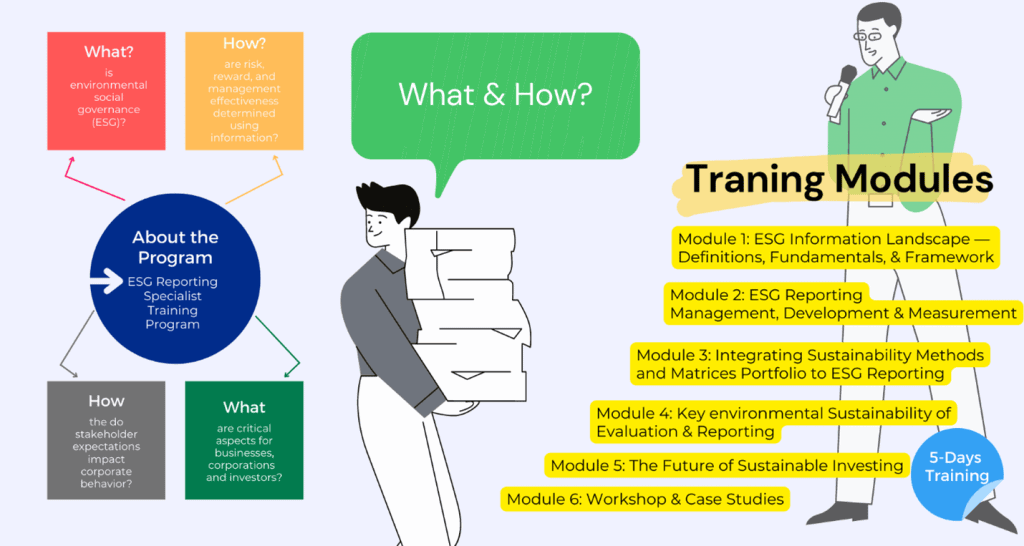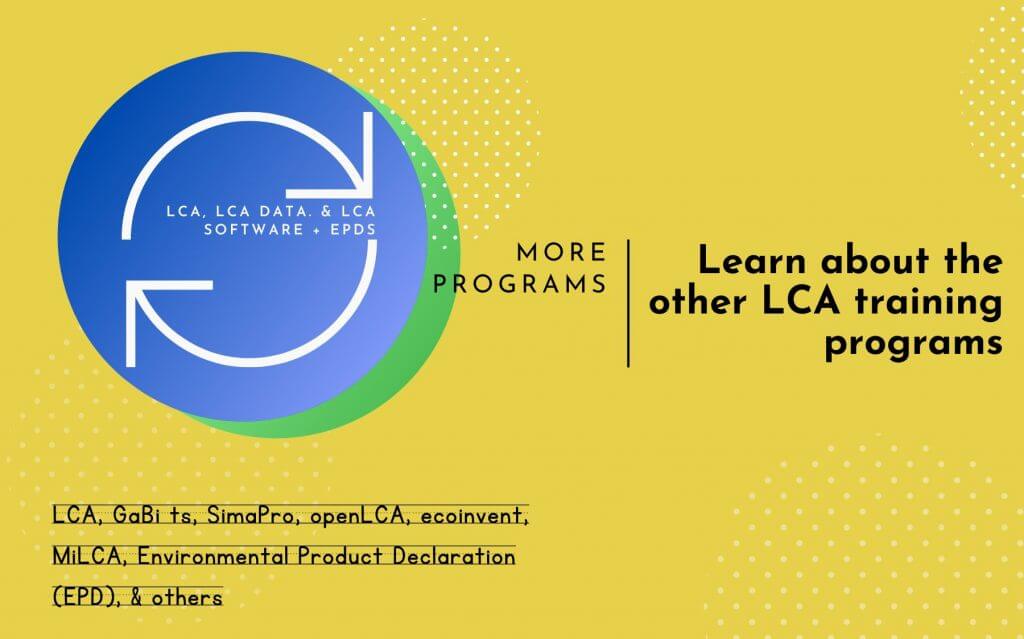18 Hours. 9 Training Modules remotely or in person.
ESG Reporting Specialist Training Program/Course
Price Per Trainee
(Request a Quote for 2+ Trainees).
- 18 Hours of Trining
- Remote Training
- Free "DEISO Spectrum" Account (spectrum.dei.so)
- In-Person at DEISO's location
- In Japan at the client location
- Outside Japan: in the client location
Quick Facts
ESG Reporting Specialist Training Program
Developing professionals in Environmental, Social, and Governance (ESG) reporting that help organizations thrive and achieve their goals through an in-depth training program.
Environmental, Social, and Governance (ESG)
The Purpose of the Training Program
DEISO's ESG Reporting Specialist Training Program
This program prepares employees who need theoretical knowledge and practical understanding and practice of ESG. This program covers various basic and high-level topics, providing an overview of the management framework for issues such as materiality and sustainability, investment decision models, and influencers are now discussing the impacts of actual topics on business, such as emissions targets, recycling, impairment caused by climate change and its consequences, and social issues in the supply chain and health.
Another aspect of the uniqueness of this training program is that it considers carefully the nature of the organization to which DEISO delivers the training. It projects its business activities of the organization, mission, vision, and goals to prepare its employees to master the knowledge and build the skills to help its organizations thrive.
Outcome & Syllabus
Duration (≈ Minutes)
|
(≈ Hours) | |||
| Module 1: ESG Information Landscape — Definitions, Fundamentals, & Framework | ||||
| 1 | What are ESG and ESG Reporting? | Day #1 | 45 min | 5 Hrs |
| 2 | Why is ESG Reporting prominent? Why is it essential, and what are the benefits? | Day #1 | 30 min | |
| 3 | Who are the most influential stakeholders in ESG Reporting? | Day #1 | 20 min | |
| 4 | What do the ESG Reporting frameworks look like? | Day #1 | 20 min | |
| 5 | What does a good ESG Report look like? | Day #1 | 30 min | |
| 6 | What does it entail for businesses to monitor and disclose ESG data? | Day #1 | 25 min | |
| 7 | Overview of international and regional environmental reporting trends | Day #1 | 30 min | |
| 8 | What makes an excellent report? | Day #1 | 30 min | |
| 9 | Who receives the honors? Who wins the award? Why? and how? | Day #1 | 20 min | |
| 10 | Who is expecting corporations to report and why? | Day #1 | 20 min | |
| 11 | Internal advantages – what is the key motivation for reporting? | Day #1 | 30 min | |
| Module 2: ESG Reporting Management, Development & Measurement | ||||
| 12 | Why do specific international standards matter? and why? What are they? | Day #2 | 35 min | 5 Hrs |
| 13 | What advantages do the Global Reporting Initiative (GRI) standard and SDGs offer? | Day #2 | 35 min | |
| 14 | How should one start with ESG reporting? Where do we begin, and how do we proceed? | Day #2 | 30 min | |
| 15 | Know the expectations of your organization and your audiences | Day #2 | 20 min | |
| 16 | Determine your goals and evaluate your readiness | Day #2 | 20 min | |
| 17 | Plan your professional and longer-term journey with ESG | Day #2 | 20 min | |
| 18 | How to concentrate on planned actions. Prepare a list of priorities and a reporting strategy: A comprehensive preparation model is described. | Day #2 | 30 min | |
| 19 | Commit, define, plan, assign tasks, gather data, establish objectives, draft, check, and prepare to publish | Day #2 | 30 min | |
| 20 | Plan your pre- and post-launch communications and engagement plan: with your team, organization, and stakeholders | Day #2 | 30 min | |
| 21 | learn what matters, acquire knowledge, react, and evolve | Day #2 | 20 min | |
| 22 | Leverage and utilize your ESG report for maximum benefit and value | Day #2 | 30 min | |
| 23 | Where are your weaknesses and the gaps, and how should you address them? | Day #3 | 20 min | 5 Hrs |
| 24 | Immediate and intermediate, and long-term aims | Day #3 | 30 min | |
| 25 | How do the key stages’ existing (and prospective) ESG Reporting requirements, and how can they be met? | Day #3 | 30 min | |
| 26 | The “climate first” approach – an authentic perspective on the Financial Stability Board’s framework for Climate-related Financial Disclosure. | Day #3 | 30 min | |
| 27 | How does the future of ESG Reporting look? | Day #3 | 30 min | |
| 28 | Software as a service (SaaS) for ESG: Data collection and reporting on the cloud | Day #3 | 25 min | |
| 29 | Data types and the approach to data and information collection | Day #3 | 25 min | |
| 30 | Using scientific and technical methods to deal with your organization’s missing data for reporting. | Day #3 | 30 min | |
| 31 | Engaging multiple stakeholders: Communicating effectively with them | Day #3 | 25 min | |
| Module 3: Integrating Sustainability Methods and Matrices Portfolio to ESG Reporting | ||||
| 32 | Innovative analysis: How to create a trade-off matrix for analysis and evaluation | Day #3 | 25 min | |
| 33 | Introduction to sustainability methods: environmental, social, and economical | Day #3 | 30 min | |
| 34 | A brief introduction to Life Cycle Assessment (LCA) as a supportive tool for ESG reporting | Day #4 | 35 min | 5 Hrs |
| 35 | A brief introduction to Social Life Cycle Assessment (S-LCA) as a supportive tool for ESG | Day #4 | 20 min | |
| 36 | A brief introduction to environmental governance to support ESG reporting | Day #4 | 25 min | |
| 37 | Sustainability (environmental, social, and economic aspects), sustainable development, and Sustainable Development Goals (SDGs) | Day #4 | 25 min | |
| Module 4: Key environmental Sustainability of Evaluation & Reporting | ||||
| 38 | Key environmental, social, and governance challenges and concerns central to ESG reporting | Day 4 | 15 min | |
| 39 | Key issues: Climate change and net-zero emissions and ESG | Day 4 | 25 min | |
| 40 | Key issues: Waste management and ESG | Day 4 | 25 min | |
| 41 | Key issues: Circular economy and ESG | Day 4 | 25 min | |
| 42 | Social impacts, governance, and ESG | Day 4 | 25 min | |
| Module 5: The Future of Sustainable Investing | ||||
| 43 | Financial and investment aspects | Day #4 | 40 min | |
| 44 | An in-depth overview of the financial stability framework for Climate-related financial disclosure | Day #4 | 40 min | |
Module 6: Workshop & Case Studies | ||||
| Workshop & Practical Case Study (Part I): Discussing the Japanese experience in ESG reporting & open discussion | Day #5 | 60 min | 5 Hrs | |
| 46 | Workshop & Practical Case Study (Part II): Analysis of an existing ESG report & open discussion | Day #5 | 120 min | |
| 47 | Workshop & Practical Case Study Part III): Preparation and building an ESG report & open discussion | Day #5 | 120 min | |
- Find out how ESG reporting works today.
- Discuss the knowledge, operations, skills, and processes in reporting ESG issues.
- Attend and well-communicate in internal and external meetings involving ESG.
- ESG reporting regulations are communicated to trainees, who are informed of the status of the regulations and up-to-date knowledge.
- Employees can respond to new expectations of their organizations through the focus of their efforts.
- Learn about the environmental, social, and governmental concerns or issues related to ESG.
- How to collect required information and data.
- Read and fully understand existing ESG reports.
- Learn about critical environmental and sustainability issues related to ESG reporting.
- Learn about financial and investment concerns and skills.
- Participants to be able to understand an existing ESG report, review, and write ESG reports in collaboration with the organization team and various stakeholders.
Topics Covered:
- The aspect of the environment: focuses on protecting the environment. Some topics include climate change, net-zero emissions, greenhouse gas emissions, pollution, energy efficiency and depletion, water depletion, water management, and resource efficiency.
- In addition to enhancing customer satisfaction and employee engagement, the social aspect of the business focuses on people and relationships.
- The aspect of corporate governance: eliminates traditional ways of governing organizations and enhances corporate governance management structure, executive compensation, and bribery and corruption prevention are examples of specific topics.
- Understand the compliance of ISO 14604-1, 14604-2, and 14604-3 standards.
- Collect data on the organization’s activities in Scopes 1, 2, and 3.
- For each scope, collect emission factors.
- Connect the dots between emissions and their sources.
- Understand the Scope 3 GHG protocol.
- Assess GHG emissions from Scopes 1 through 3. (Full GHG accounting).
- Learn how to incorporate the value chain into your GHG accounting.
- Validate the results using the standard.
- What is the best way to convey and visualize the results?
- Professionally prepare GHG accounting reports and visualize the results.






